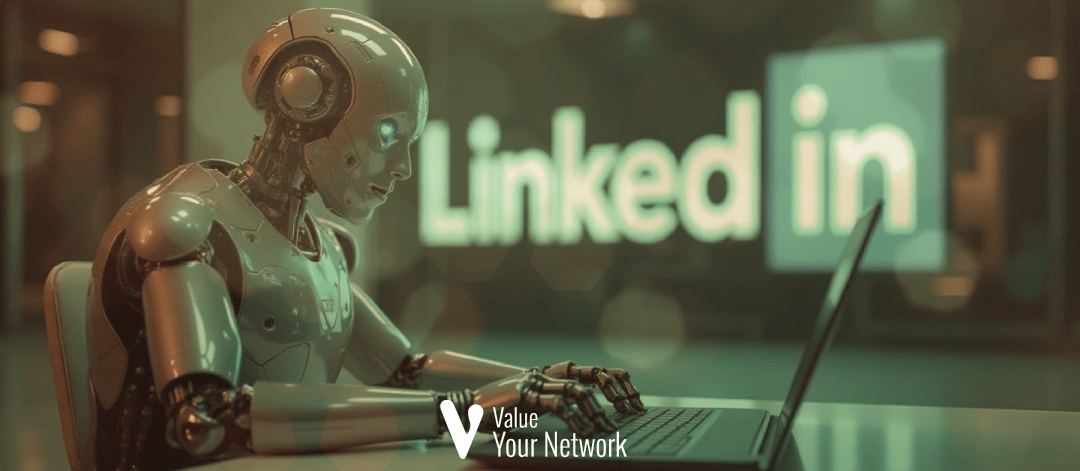61 % of LinkedIn posts in French are written with AI. Discover the dangers of this standardization and how to preserve authenticity on LinkedIn in 2025.
In 2024, the LinkedIn landscape was shaken up by a disturbing revelation: 61,% of French posts on this professional platform are partially or entirely written with artificial intelligence tools. This figure, from an analysis of 20,000 publications conducted by the Influence Metrics agency, illustrates a major trend that raises as many questions as it arouses fascination. While AI promises speed and efficiency, it also raises major concerns in terms of creativity, authenticity and reliability of content.
The omnipresence of AI: a global phenomenon
France is not alone in this race for automation. A study conducted in the United States at the end of 2024 shows that the use of generative tools such as ChatGPT or Jasper jumped by 189 % in one year. These tools allow millions of users to produce texts optimized for the algorithm, but often disconnected from any originality or personalization.
The observation is global: users adopt these tools to gain productivity, but the content generated tends to become homogeneous and predictable. What remains of the human voice in this whirlwind of automation?
Why is AI so attractive on LinkedIn?
The attractiveness of AI tools is based on several advantages:
- Time-saving : Producing an engaging post now only takes a few minutes.
- Optimization SEO : Generators integrate keywords that improve visibility.
- Reduced cost : A subscription to an AI tool costs much less than hiring a professional editor.
- Accessibility : Even users who are not comfortable with writing can create professional content.
However, these benefits come with a downside. According to Nataniel Bahs, founder of Influence Metrics, “this standardization seriously harms authenticity, which is nevertheless an essential lever for visibility and success on LinkedIn.”
The risks of homogenization of content
With 61 % of posts written by AIs, the danger is clear: a gradual loss of diversity and creativity. Posts end up looking similar, adopting similar structures and predictable turns of phrase. This homogenization makes it difficult for users to stand out or build a strong identity.
Another major problem is the quality of the information shared. Content generators, while effective, often focus on generalities or poorly sourced content, to the detriment of in-depth thinking or real expertise. Thus, LinkedIn, once a place for exchanging ideas and sharing knowledge, risks becoming a platform saturated with banalities.
The balance between AI and human creativity
The key question remains: how can AI be used without sacrificing authenticity? The answer likely lies in a hybrid approach. Rather than relying entirely on automation, users could combine AI capabilities with their own unique experience and insight.
For example:
- AI can generate a draft or post structure.
- The user must then personalize and enrich the content with anecdotes, real facts and personal reflections.
This collaboration could help harness the power of AI while preserving what makes good content strong: a human and authentic touch.
The dangers of a booming market
With the explosion in AI use, a parallel market has developed, offering training or tools promising to "boost" online presence through content generators. But, according to Influence Metrics, not all of these offers are reliable. Some platforms simply package free features like those of ChatGPT into a paid interface, thus misleading users.
Additionally, some tools claim to offer miracle solutions to quickly grow a LinkedIn account, but their excessive use could quickly be detected by the algorithm, leading to a decrease in the reach of posts or even sanctions.
The future of LinkedIn content: what strategy should we adopt in 2025?
As AI tools evolve, it is likely that their use will become even more sophisticated. However, to maintain a effective strategy On LinkedIn, users should focus on three essential elements:
- Authenticity : Favor posts that reflect real experience or expertise.
- Commitment : Interact with your audience to create a real connection.
- Creativity : Introduce new and surprising perspectives, even in standard formats.
Towards an AI-dominated LinkedIn?
Artificial intelligence is profoundly transforming LinkedIn, offering both opportunities and challenges. Users will have to learn to navigate this world where authenticity and automation coexist. The challenge is daunting, but those who find the right balance between technology and human creativity will thrive.

